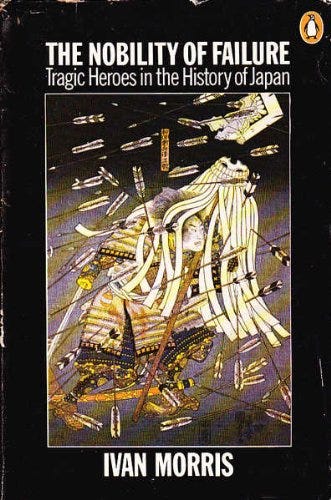Book review – ‘The Nobility of Failure – Tragic Heroes in the History of Japan’. Ivan Morris.
Japanese history written with a particular twist.
If any westerner had the handle on Japanese culture it was Ivan Morris (1925 – 1976). He was a scholar and an assiduous observer, open-minded with the ability to really get to the heart of the matter.
I first read this book back in 1982, there was something about the romanticism and fated heroism that appealed to me at that time.
Morris gave me a trip through Japanese history and folklore, a real rollercoaster ride filled with feuds, rivalry, warfare and chiefly, the sentiments of honour and duty.
Morris was a friend of the Japanese author Mishima Yukio, who he had known since the early 1950’s. Morris and Mishima were definitely not on the same page politically, which was something much more than just their cultural backgrounds.
Mishima was that odd mixture of admiration for the West and a deeply ingrained, reactionary raw-nerved instinct for Japan’s heroic past; so much so that he sought to cast himself in the role that Morris does his best to describe throughout the book – the doomed hero pitching himself against impossible odds.
Ivan Morris clearly linked this book to Mishima’s dramatic and very public death in 1970. Evidenced in this rebuke to American writer Gore Vidal, who thought it necessary to take a swing at Mishima. In his retort, Morris does not mix his words:
‘Mr Vidal describes Mishima’s suicide as a piece of showmanship “more Western than Japanese in its romanticism.” Not so. The timing and execution of Mishima’s death fit squarely into the pattern of Japan’s failed heroes, belonging to a tradition that goes back to the country’s earliest history”.
Quote from the New York Review 1971.
Morris is really good at picking apart a very Japanese cultural gravitation towards the underdog; although I don’t think it’s necessarily unique to the Japanese.
For example; there seems to be a whole recent revaluation of the last days of Napoleon (Oh God how the French kicked back against the recent Ridley Scott movie), so,.., with Napoleon, was he rags to riches, poor boy to military hero, leader to dictator, to emperor, and then just victim of his own folly, ending at Waterloo and then St Helena? But, as Ridley Scott shows; there was a certain romance attached to it.
Japanese cultural principles.
What comes across in Morris’s book are those very same qualities that are literally woven into the fabric of Japanese martial culture; the Budo attributes, variously listed as:
· Jin – Benevolence.
· Gi – Honour or Justice.
· Rei – Courtesy and etiquette.
· Chi – Wisdom or intelligence.
· Shin – Sincerity.
· Chu – Loyalty.
· Koh – Piety.
To Morris, without really spelling it out, these are the glue that holds the whole thing together.
In the book, he takes us on a chronological history of specific examples, explained without getting bogged down in dull scholarly detail.
The final chapter relates to the Pacific War and the Kamikaze pilots, which Morris deals with in an appropriately detached objective manner.
Heroes and villains.
The book highlights the Japanese adoration of the doomed hero, nearly always undone by treachery. But what about the traitors?
Often these same ruthless individuals were the ones responsible for improving the state of the nation for the greater good. But the Japanese deplore the very idea of powerful but ultimately well-meaning brokers who feel the need to employ dastardly subterfuge to achieve their ends.
Explore the story of ‘the last samurai’ (on which the character of Katsumoto in the Tom Cruise movie is based). The real ‘last samurai’ was Saigo Takamori (1822 – 1877) who led the doomed Satsuma rebellion against the Meiji government and died on the battlefield after taking a mortal bullet in the hip and then ritually beheaded by one of his faithful followers.
With a book of this nature it’s not just the history, it’s the mentality. Of course you could find similar examples in the west, everybody cheers for the underdog, but there is something distinctly different about the Japanese attitude towards the legacy of the failed mission, the doomed individual, taken with all their imperfections.
I would direct readers to the observation of the frequency of self-destruction in these tales. In the western tradition it is rare to find an equivalent of the ritualised, supposedly highly honourable act of Seppuku (Hara-Kiri). You have to wonder about that.
All the same, a book worth reading.





Re: Mishima just read Beautiful Star after getting bombarded with YouTube shorts of Mishima a month ago. Recommend.